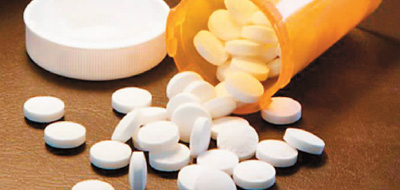
Is aspirin taken on an empty stomach or after meals??
Some patients taking aspirin for a long time may cause digestive tract damage. Aspirin-induced digestive tract injury is the result of local and systemic effects. The local effect is that aspirin directly stimulates the digestive tract mucosa, directly damages the gastric mucosa, and also damages the intestinal mucosal barrier. The systemic effect is that it reduces prostaglandin synthesis, and prostaglandin is a substance that can regulate gastrointestinal blood flow, stimulate the synthesis and secretion of mucus and bicarbonate, and protect gastric mucosa.
If you take aspirin enteric-coated tablets, there is an acid-resistant coating outside it, and the environment in the stomach is acidic. The acid-resistant coating can protect the acidic environment in the stomach from being dissolved and released, and then it can be slowly released and absorbed in the alkaline environment of the small intestine, thus reducing the direct stimulation to the gastric mucosa and the adverse reactions of the gastrointestinal tract. Therefore, aspirin enteric-coated tablets are recommended to be taken on an empty stomach. Furthermore, taking it on an empty stomach can shorten the retention time in the stomach, and then reach the absorption site of the small intestine smoothly, thus avoiding the gastrointestinal adverse reactions caused by the prolonged retention time in the stomach. However, if you use ordinary aspirin tablets instead of enteric-coated aspirin tablets, there is no such protective mechanism, and such aspirin should be taken after meals.
What time do you mean by fasting and after meals??
Taking medicine on an empty stomach actually means 1 hour before eating or 2 hours after eating. Taking medicine after meals does not mean taking medicine immediately after meals, but taking it 15-30 minutes after eating.
Should aspirin be taken in the morning or at night??
This issue is still inconclusive. Some experts believe that the viscosity of platelets at night is higher and the risk of thrombosis is higher, so aspirin should be taken at night to play its antiplatelet role; Some experts also believe that the risk of cardiovascular risk events in the morning is high, so it should be taken in the morning to prevent cardiovascular risk events.
Aspirin exerts its antiplatelet effect by irreversibly inhibiting cyclooxygenase, which can exist in the whole life cycle of platelets (about 10 days). Once it takes effect, its antiplatelet effect is persistent. Therefore, aspirin can be taken at any time of the day (morning, noon or evening), and it is important to take it regularly at the same time every day.
Can aspirin be taken apart??
In most cases, aspirin enteric-coated tablets can’t be opened for use, because the outer coating plays a protective role in gastric mucosa. If you take it open, it will destroy the surface coating and lose the protective effect of enteric-coated tablets. If the dosage is relatively large, aspirin enteric-coated tablets with smaller specifications can be replaced.
When can I chew it??
You need to chew it when you save yourself from myocardial infarction. Correct pre-hospital first aid is one of the key factors to reduce the mortality rate of myocardial infarction. If there are elderly people over 50 years old or patients with coronary heart disease at home, you should always keep aspirin and take it with you when you go out.
The typical symptoms of myocardial infarction are pain in the middle or left part of the sternum, feeling of dying and oppression, accompanied by sweating and nausea. When a patient is suspected of having a myocardial infarction, he can immediately chew up 300 mg of aspirin and call 120. At this time, chewing aspirin enteric-coated tablets can make the drug disintegrate quickly, accelerate the absorption of the drug, and make it play an anti-platelet role more quickly. In addition, before coronary stent surgery, you can also take chewing aspirin to play a quick role.
(Peng Wenxing is the pharmacist in charge of the Pharmaceutical Department of Beijing anzhen hospital affiliated to Capital Medical University.)